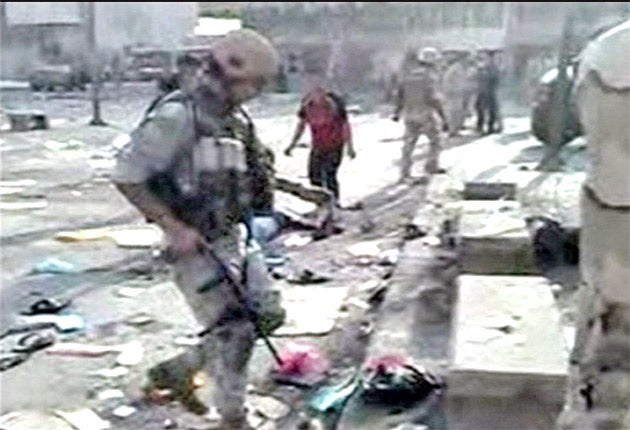Army recruits targeted in Iraq suicide bomber attack, leaving 61 dead

Your support helps us to tell the story
From reproductive rights to climate change to Big Tech, The Independent is on the ground when the story is developing. Whether it's investigating the financials of Elon Musk's pro-Trump PAC or producing our latest documentary, 'The A Word', which shines a light on the American women fighting for reproductive rights, we know how important it is to parse out the facts from the messaging.
At such a critical moment in US history, we need reporters on the ground. Your donation allows us to keep sending journalists to speak to both sides of the story.
The Independent is trusted by Americans across the entire political spectrum. And unlike many other quality news outlets, we choose not to lock Americans out of our reporting and analysis with paywalls. We believe quality journalism should be available to everyone, paid for by those who can afford it.
Your support makes all the difference.A suicide bomber blew himself up in Baghdad yesterday killing 61 people who had queued for hours to join the Iraqi army just two weeks before American forces prepare to pull out of the country.
Some of the thousand men who had queued from dawn for a chance to get a job in the military were so desperate for work that they returned to the line after being treated at hospitals for their wounds. Despite the risks, many Iraqis are lured by the prospect of steady wages with few jobs available after years of war.
The attack and the start of an assassination campaign on judges by another insurgent group amounted to the deadliest series of attacks in several months. In Baghdad and Diyala province, the insurgents attacked eight judges, killing two of them.
A Justice Ministry spokesman said: "These attacks are well orchestrated. They are targeting the entire judicial system of the country."
The US will reduce its mission to about 50,000 for training purposes in the immediate future with those also leaving by the end of the year.
The Obama administration has followed its Republican predecessors by insisting that that the "surge" carried out under General David Petraeus had succeeded in significantly reducing the terrorist threat in Iraq, enabling the withdrawal to take place.
General Petraeus, now the US head of Nato forces in Afghanistan following the sacking of General Stanley McChrystal, has spent the past few days in Washington warning of the risks of President Barack Obama's plan for troops to start leaving Afghanistan by July next year.
Iraqi figures, from the head of the country's army, General Babaker Shawkat Zebari, to Tariq Aziz, the deputy prime minister under Saddam Hussein, have warned that the Americans are pulling out too soon.
A drive to recruit more members of the armed forces has followed to make up for this security shortfall. The recruitment centre normally receives about 250 new recruits each week, but numbers had risen yesterday because of the deadline for applications.
"We couldn't get another place for the recruits," said the Iraqi military spokesman, Maj-Gen Qassim al-Moussawi, after being asked why the army used an open and unprotected site in central Baghdad's Maidan Square to gather recruits.
"It was difficult to control the area because it's an open area and because of the large number of recruits."
The bomber simply walked up and joined the applicants and set off the explosives. Bodies of men, some still clutching job applications in their hands, were scattered on the ground outside the military headquarters.
"Severed hands and legs were falling over me. I was soaked with blood from the body parts, and wounded and dead people falling over and beside me," said Yasir Ali, who had been waiting outside the headquarters since 4 am.
Saleh Aziz said: "We were lined in a long queue. There were also officers and soldiers. Suddenly an explosion happened. Thank Allah only my hand was injured."
July has been the bloodiest month since May 2008, with more than 500 killed.
In another attack last month, a suicide bomber ripped through a line of anti-al-Qa'ida Sunni fighters waiting to collect their pay near an Iraqi army base, killing 45 people in the mostly Sunni district of Radwaniya, south-west of Baghdad.
Meanwhile, the country's politics has remained deadlocked five months after national elections, with no new government yet in place.
On Monday, the al-Iraqiya bloc that narrowly won the most seats in March suspended talks with the second-placed Shia-led State of Law alliance of the Prime Minister, Nouri al-Maliki.
Al-Iraqiya, which is led by a former prime minister, Iyad Allawi, and says it is non-sectarian, was upset by a TV interview in which Mr Maliki said al-Iraqiya represented the Sunnis of Iraq.
Mr Allawi's alliance includes vice-president Tariq al-Hashemi, a Sunni Arab, and senior Sunni politician Saleh al-Mutlaq.
Subscribe to Independent Premium to bookmark this article
Want to bookmark your favourite articles and stories to read or reference later? Start your Independent Premium subscription today.
Join our commenting forum
Join thought-provoking conversations, follow other Independent readers and see their replies
Comments